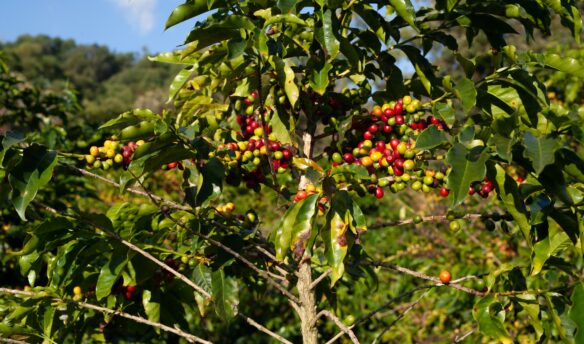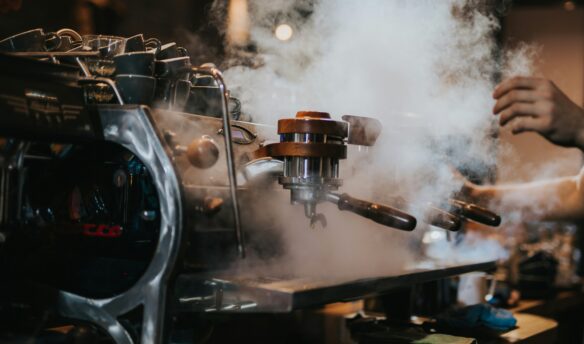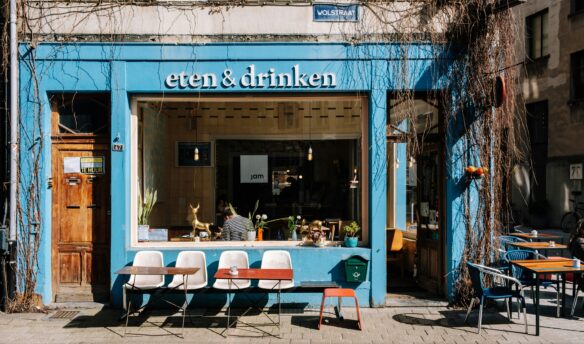Happy birthday, Starbucks Workers United! Meanwhile, EU regulators agree on a law to stop the import of products associated with deforestation, Dublin’s 3FE launches a reusable coffee bag, and breaking news: coffee wakes you up!
‘EU Regulators Agree on New ‘Deforestation-Free’ Rules Affecting Coffee’ – via Daily Coffee News
In an effort to end global deforestation, EU lawmakers have provisionally approved new legislation that bans the import of certain products, including coffee, if they are found to cause forest destruction.
The law would require European companies importing certain commodities—coffee, cocoa, palm oil, soya, beef, and wood—to produce a due diligence statement proving that their products are not contributing to deforestation. Companies that break the law could face fines of up to four percent of their annual EU sales. The legislation will protect at least 72,000 hectares of forest each year and lead to a reduction in global carbon emissions equivalent to the yearly emissions of Denmark.
Deforestation—removing forests to use the land for something else—is a significant driver of climate change, responsible for around ten percent of global greenhouse gas emissions. That figure rises if forest degradation—changes that affect a forest’s structure or function but won’t decrease its area—is also factored in.
Coffee growing contributes to deforestation and degradation as producers seek to meet ever-rising demand by expanding their farms. However, not all coffee farms are created equal. Many large, full-sun farms are out there producing commodity-grade coffee, but millions of smallholder producers work tiny plots of land with a comparatively minuscule carbon footprint. Some farms can even reduce the amount of carbon in the atmosphere.
Despite widespread support for the new law, small farmers may be disproportionately affected. Gert van der Bijl, Senior EU Policy Advisor for the Solidaridad Network, wrote in a LinkedIn piece that “in practice, the legislation will create tremendous challenges for many millions of smallholder families in sectors like coffee, cocoa, palm oil, and rubber.”
The bill is onerous for small producers, van der Bijl notes, and it could lead to companies not buying from smallholders or passing the cost of compliance down to those least able to pay.
‘Dublin’s 3FE Announces Póca, A Reusable Coffee Bag’ – via Sprudge
It’s incredible that nobody has come up with the “KeepCup but for coffee beans,” to paraphrase Colin Harmon, referring to the reusable coffee mug brand responsible for diverting disposable cups from landfills. But it’s here now courtesy of 3FE and Harmon, who was inspired by the proliferation of reusable coffee cups around Ireland but noticed a distinct lack of compact, reusable coffee bean containers.
Reusable coffee containers have been around forever, but a collapsable, sealable, and well-designed receptacle could be a game-changer.
Póca is a food-safe and dishwasher-friendly silicone bag with an aluminum clip that acts as a one-way valve, keeping the bag sealed while allowing the coffee to degas. Harmon announced the release of Póca on his Instagram page, and the bag is now available on 3FE’s website.
Coffee bags have long been a sticking point for sustainably-minded roasters and cafes. Plastic and foil still dominate, recycling plastic is controversial at best, and the promise of home compostable alternatives has been hampered by ineffectiveness and greenwashing.
Póca is made from silicone, which has its own dubious environmental creds—although primarily composed of silica, silicone contains similar hydrocarbons to plastic and won’t biodegrade for many, many years. As we’ll see further down, sustainable packaging in the coffee industry is a tricky thing to get right.
However, silicone is very reusable, allowing Póca to fulfill the second in the “reduce, reuse, recycle” axiom and offer an alternative for all those who lug around mason jars or crumpled-up old coffee bags to refill (🙋).
More News
‘Southern California Chain Reborn Coffee Plans Expansion Into Korea’ – via Daily Coffee News
‘% Arabica Opens its First Roastery in Indonesia’ – via World Coffee Portal
‘Global Coffee Supply Balance Surplus Expected Next Season’ – via Reuters
‘Ethiopia Green Coffee Specialist Catalyst Trade Expands Into Peru, Kenya’ – via Daily Coffee News
‘Neumann Kaffee Gruppe Rejoins Global Coffee Platform’ – via Global Coffee Report
‘Meet Kara, A New Modular Espresso Machine That’s Rethinking Sustainability’ – via Sprudge
‘Bellwether, Sustainable Harvest and Fairtrade Meet’ Living Income’ Price in Guatemala’ – via Daily Coffee News
‘Starbucks Union Workers Have a Holiday Wish: Don’t Buy Starbucks Gift Cards’ via In These Times
The Week in Coffee Unionizing
Friday marked the first anniversary of the first Starbucks union victory in the United States. On December 9, 2021, baristas at a Buffalo, NY, location voted 19-8 in favor of joining Workers United.
In the year since, what became Starbucks Workers United has held votes at more than 330 stores, with 268 voting to join the union. Despite being a tiny fraction of the 8,000+ Starbucks stores across the country, the union has challenged Starbucks, a brand once hailed for its inclusivity and pro-worker stance.
Starbucks has fought the union at every turn. According to the National Labor Relations Board, 457 unfair labor practice charges have been filed since last December, alleging intimidation and retaliation for organizing in the form of firing union leaders and closing stores.
Starbucks has also been slow to negotiate contracts with stores that voted to unionize, with organizers alleging unfair labor practices and delays on the part of company negotiators. Starbucks, for its part, insists that it is bargaining in good faith and that it is actually the union slowing things down.
The Starbucks union has been credited with reigniting Americans’ interest in and approval of the labor movement and has spread to other coffee chains such as Peet’s. Although momentum has slowed in recent months, two stores voted to unionize in Illinois, one in Washington, and one in Wisconsin just in the past ten days.
The Week in Corporate Coffeewashing
Chamberlain Coffee, the fast-growing Gen-Z-focused brand launched by YouTube star Emma Chamberlain, is now offering “environmentally friendly” coffee pods.
The brand states that the Keurig-friendly pods are commercially compostable and carbon neutral. Plastic pods produce a tremendous amount of waste, with billions sent to landfills or burned yearly. While the compostable pods respond to this problem, it’s unclear how the carbon-neutral claim is supported.
Compostable products actually have to be composted to be effective. When added to landfills, “compostable” plastic such as PLA doesn’t compost, acting like plastic and doing nothing, or worse, anaerobically decomposing and releasing methane gas.
The article doesn’t say what the pods are made from, other than that they’re “created out of patented plant-based materials.”
Whether bioplastics and compostable alternatives are better than regular fossil fuel-derived plastics is up for debate. It’s not just about end-of-life outcomes: one must consider life cycle assessments, feedstocks such as corn competing with food, and production emissions.
Like everything else, it’s complicated. Commercially compostable pods, bags, cups, or whatever, are no magic bullet when it comes to the climate crisis, and it’s worth being suspicious of anyone telling you they are.
Is Coffee Good For You?
Stop the presses—drinking caffeine reduces drowsiness.
A new study from Mahidol University in Thailand, published in Physiology & Behavior, used electroencephalography (EEG) and cognitive tests to show that drinking a caffeinated beverage in the morning enhances working or short-term memory and reduces alpha wave activity, a type of brain activity associated with drowsiness.
It’s worth mentioning some limitations: the research only featured 25 participants, and each subject was given the same dose of caffeine regardless of weight or height, meaning that each person had different concentrations of caffeine in their body.
That being said, the results showed that half an hour after consuming 50mg of caffeine, brain activity indicating drowsiness had decreased and cognitive functioning had improved, results that the authors describe several times as “significant.” The dose of caffeine was equal to a cup of tea or a can of Coke but only about half a cup of coffee.
So tell your friends, tell your family, tell your co-workers: a small cup of coffee in the morning will wake you up.
Beyond the Headlines
‘A Better Table Podcast With US Barista Champion Morgan Eckroth’ on Sprudge Media Network
‘Understanding and Evaluating Labor Abuse Risk in the Coffee Sector’ by Quinn Kepes and Miguel Zamora
Coffee News Club is written by Fionn Pooler and the Fresh Cup editorial team.















